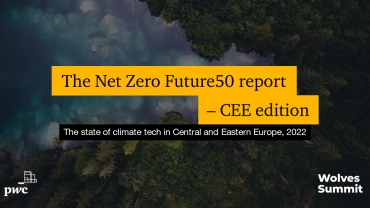
As we head into COP27, the annual United Nations summit on climate, we reflect on a year in which climate action has fallen short of ambition. Stark results from PwC’s latest Net Zero Economy Index analysis found that the global rate of decarbonisation declined to just 0.5% per year over the past 12 months, far below the 15.2% rate that society now needs to limit warming to 1.5°C. With a shrinking window for action, it’s more crucial than ever to accelerate innovation. But has recent financing for climate tech met the urgency of the challenge?
The answer is mixed. On the one hand, there are reasons to remain optimistic.
- In the face of their first real test over the past decade, climate tech markets have shown encouraging resilience. With a background of war in Europe, inflation, and a sharp correction in the capital markets, there was potential for investor confidence to crumble, as it had in the notorious boom-and-bust era of cleantech a decade ago. Critically, it did not: indeed, eight in ten investors surveyed this year plan to increase their investment in environmental, social and governance (ESG) products over the next two years. And the investors we’ve interviewed remain optimistic about the outlook for the market.
- Comparing climate tech to the wider market backs up this story. Climate tech’s share of investment in 2022 has hovered at historic highs, even considering a natural softening after a strong 2021 and a retreat in special purpose acquisition companies (SPAC) activity. In fact, climate tech investment in the 12 months to Q3 2022 represented more than a quarter of every venture dollar invested, a greater proportion than 12 of the prior 16 quarters. Indeed, these levels for rolling 12-month average investment have been mostly stable since the beginning of 2021.
On the other hand, there are also reasons for concern.
- Compared with a bumper investment year in 2021, this year has seen a steady drop in overall investment levels. Venture funding fell to US$52 billion over the first three quarters of 2022, or 30% less than the same period last year.
- The volume of critical early-stage funding required to scale up the next wave of climate tech success stories is trending in the wrong direction. The deficit of funding and the decline in the number of deals for early-stage start-ups that are looking to scale up, which we first identified last year, appear to be deepening.
- Investment is still not aligned with carbon impact, reflecting an inefficient market for investing in climate outcomes.
A cyclical slowdown in climate tech investing?
The contraction of venture capital investments in climate tech may reflect the kind of cyclicality seen elsewhere in corporate deal-making—a natural decline after a period of significant growth. Much of the surge in climate tech investment in 2021 can be attributed to a handful of megadeals facilitated through special purpose acquisition companies (SPACs). Although many investors we spoke to at the time were positive about the impact of SPACs in improving liquidity, they were sceptical about whether SPACs would remain a major contributor to investment in the medium term. That expectation has been borne out in our data, which finds that SPAC funding in climate tech has decreased from a record high of US$9.3 billion (against 25 deals) in Q3 2021 to just US$800 million (against three deals) a year later.
The good news is that aside from the SPAC-driven peak in Q3 2021, which now appears to have been an anomaly, this year’s decline in climate tech investment looks far less drastic. In 2022, investment has been in the US$15 billion–$20 billion range per quarter, well in line with the first half of 2021. In aggregate, since the start of 2018, US$260 billion has been raised for climate tech, including more than US$50 billion in 2022.
Interestingly, we see that this maintenance of investment levels has been in defiance of economic headwinds and a recent slowdown in the overall venture capital market. In fact, climate tech investment in the 12 months up to and including the most recent financial quarter represented 26% of overall invested equity, in the upper half of the 20%–30% range observed since the start of 2018.
Demand gets turbocharged
While venture investment in climate tech may have slowed, wider investment into the net-zero transition—including technology—signals increasing demand. These macro trends are coming both from the public sector, where policy support is creating an enabling environment for climate tech start-ups, and from the private sector, which continues to ratchet up demand for net-zero solutions.
On the public-sector side, policymakers appear increasingly to appreciate the connections among climate security, energy security and economic security. Indeed, many public-sector climate initiatives are communicated in terms of economic growth first and foremost, rather than being primarily driven by ESG considerations. This approach enables policymakers to shore up public support because of volatile economic conditions, and not just in spite of them. Examples of recent moves that could benefit climate tech start-ups include the following:
- In Europe, European Commission President Ursula von der Leyen has set climate change as a top priority since she first took office in 2019. Also, the war in Ukraine has only increased Europe’s plans for adoption of energy-efficiency and renewable-energy technology since, as governments seek to tackle rising energy prices and energy security.1 Climate tech solutions across all sectors stand to benefit, including technologies such as heat pumps and green hydrogen.
- China has invested heavily in the net-zero transition, spending US$266 billion on the deployment of low-carbon technologies in 2021.2 As this spending continues to deepen the country’s supply chain for minerals that are critical to the net-zero transition, start-ups that focus on solutions such as battery technology and electric vehicles gain a competitive advantage.
- In the US, federal government spending on climate tech and clean energy is set to more than triple, reaching US$500 billion over the next ten years,3 driven by legislation such as the Inflation Reduction Act, Infrastructure Investment and Jobs Act, and the CHIPS and Science Act. Notable highlights include a commitment to procure 100% zero-emission light-duty vehicles by 2027 and all vehicles by 2035 for federal use,4 and an increase in tax credits of up to US$85 per metric ton for captured and stored carbon. These initiatives provide a huge step-change in the addressable market for climate tech start-ups, while also reducing their costs.
- Also in the US, action is taking place at the state level. New York has established ambitious new requirements for building efficiency, for example,5 and California issued a rule in August banning the sale of new gasoline-powered vehicles starting in 2035.6
Meanwhile, the private sector has turned its focus to the ‘time value of carbon’—how to balance near-term net-zero levers while also developing solutions to mitigate emissions in the long term. For the latter, initiatives such as the First Movers Coalition and Frontier have emerged to strengthen the demand signal for climate tech solutions, which is allowing investors to fund the scaling up of emerging start-ups. Investors expect these initiatives to drive increased investment and growth in climate tech. Although it may take some months for the full impact to show up in our investment data, we’re already seeing early signs of impact.
Take, for example, investor-grade data intelligence on GHG emissions. Corporate interest in this and other ESG issues has increased year on year, likely driven by the need for enterprise software solutions that meet regulatory and investor expectations on ESG data. A thriving start-up ecosystem is active in the GHG data intelligence area, with solutions that include GHG accounting; supply chain traceability; and environment, health and safety reporting. We’ve identified nearly 300 deals since the start of 2021, with over US$2.8 billion raised in the first three quarters of 2022.
It’s worth noting a sharp drop-off in the number and value of deals observed in Q3 2022, however, perhaps in response to new product launches from major tech players.7 With new regulatory reporting requirements around non-financial data coming into play around the world, investors expect customer demand to continue to grow.
Likewise, consider carbon capture, utilisation and storage. After modest investment and growth for many years, overall funding in the first three quarters of 2022 has already been nearly twice that of all of 2021. Although there were comparatively fewer deals in 2022 than in 2021, these are increasingly later-stage venture deals, and with larger average deal sizes. This growth has been driven by policy commitments and projections on the future size of the carbon markets.
Again, however, it’s worth noting that the market still remains small compared with its overall emissions-reduction potential and the forecasts made by scientists on the volume of carbon removal needed to meet the Paris Agreement goals. A comparatively quieter Q3 2022 deal period suggests more focus is needed to grow the pipeline of deals in this sector.
Key stats about our climate tech 2022 study
0+ climate tech startups tracked
$0bn+ invested in climate tech between 2018 Q1 and 2022 Q3
$0bn+ invested in climate tech in 2022 Q1–3
-0% growth in investment year-on-year Q1–3 2021 to Q1–3 2022
0+ climate tech deals tracked since 2018
0+ unique investors identified since 2019
0 megadeals (deals worth $100m+) since 2018
0+ Climate tech start-ups valued at $1bn+ at most recent deal date
An inefficient market for investing in climate outcomes
Public- and private-sector initiatives might each be bringing in more investment dollars, but to meet increasingly urgent net-zero climate goals still more needs to be focused on two areas: early stage funding and technologies with the highest potential for reducing emissions.
The first challenge is around the number and total value of small deals, typically at the earliest stages of funding, which have been declining since the start of 2021. At the same time, deals with financing between US$5 million and US$1 billion, typically at later stages of funding, have fared well, with overall funding levels and number of deals largely resisting the downturn we’ve seen in both the climate tech markets and wider venture capital.
Blockbuster deals of over US$1 billion had hovered consistently between US$2 billion and US$5 billion for most of the 2018–2021 period. This year has seen a drop-off in blockbuster deals, with none in the first half. Q3 2022 did see a sharp uptick in the number of deals, though the average value dropped sharply compared with prior years. This is perhaps unsurprising in light of the slowdown in public market equities.
Venture capital investment in climate tech by deal size
The trend is troubling, because although levels of dry powder remain high, it’s unclear how it might be deployed effectively without a stronger pipeline of early stage funding for climate tech start-ups. As one fund manager we spoke with mused, we may soon find that there aren’t enough high-quality start-ups coming through from early rounds of funding for later stage funds to deploy all the money they’ve raised. This gap between initial, pre-seed funding and series A and B levels is what we call the ‘valley of death’ for early stage start-ups.
Why that’s the case requires further investigation. However, we’ve heard repeatedly from investors that reporting requirements for ESG funds can be onerous, and that funds targeted at earlier funding rounds may not have the economies of scale to cover the transaction costs. As one investor characterized it, if you want to be a ‘dirty’ investor you can set up a fund and you’re up and running, but if you want to be a ‘clean’ investor you face an onerous number of regulations and policy guidelines, which take time and skilled capacity to comply with.
The second challenge is around impact, which we looked at from two angles: a sector view and a technology view. At the sector level, as we first observed in our 2021 report, the flow of investment into climate technology is still not in proportion to each sector’s contribution to the flow of GHGs into the atmosphere. However, we have found signs of modest improvement.
Last year, we found that mobility attracted 61% of funding, despite being responsible for just 16% of global emissions. This year, we find that mobility continues to absorb the bulk of climate tech investment, 48%, with most recent GHG data suggesting it’s responsible for 15% of global emissions. Technologies directed at the other sectors responsible for 85% of emissions have attracted more than half of climate tech investment combined, up from only 39% last year.
Share of global emissions and climate tech venture investment by sector
Comparing sectoral emissions figures to investment is a helpful intuitive measure, but it doesn’t take into account the specific solutions that will drive impact, their marginal abatement cost and their readiness for venture funding. However, even from a technology perspective, the picture isn’t any better.
A comparison of technological maturity with the potential for emissions-reduction potential—or forward-looking climate impact—reinforces an image of a market that’s not yet efficient at meeting climate objectives. Solutions such as food waste technology and carbon capture and removal remain comparatively underfunded, for a multitude of reasons. To keep Paris Agreement goals within reach, an enabling environment would support more funding towards technologies that have the highest potential to lower emissions and that are sufficiently advanced to have an immediate impact on emissions.
An inefficient market for investing in climate outcomes
That distinction is critical. As one investor described it, when we take into account escalating risks, the price of externalities and the side effects of increased emissions over time, it’s clear that abating a ton of carbon today has a greater impact than abating a ton tomorrow. While net-zero technologies, such as fusion or hydrogen-based fuels, are the ultimate goal, their impact is longer term. Let’s not lose interest in what might be called transition technologies, such as carbon capture, which are near or already at maturity and ready to scale up now.
As society grapples with how to halve emissions by 2030, more discussion is needed on the solutions and structural transformation required for a fair and just transition. More investment is needed into climate tech—not just at the top level, but with better spread across sectors and solutions, across different start-up sizes and across different technological maturity levels. If we don’t reverse the drop-off of investment seen in Q3 2022, we may find the Paris Agreement’s goals soon out of reach.
More investment in climate tech is needed, particularly in areas that can have the greatest impact over the shortest period of time. This year’s contraction is certainly reason for concern, particularly due to the impact it will have longer-term—but there are signs that investors, policymakers and other stakeholders remain eager to pick up the pace.
Footnotes:
[1] The six policy priorities of the von der Leyen Commission, European Parliament (Sep 2022)
[2] China Is the Growth Engine of World’s Low-Carbon Spending | BloombergNEF, BloombergNEF (Feb 2022)
[3] Three laws will triple US climate change spending over the next decade, World Economic Forum (Sep 2022)
[4] FACT SHEET: Biden-Harris Administration Proposes New Standards for National Electric Vehicle Charging Network | The White House (June 2022)
[5] https://www1.nyc.gov/site/sustainablebuildings/ll97/local-law-97.page
[6] https://ww2.arb.ca.gov/sites/default/files/barcu/board/books/2022/082522/prores22-12.pdf
[7] Lagged data collection also means currently recorded Q3 2022 deals likely underestimate actual total market activity, although we expect a substantial gap to remain even once our dataset is more complete.
Contact us

















